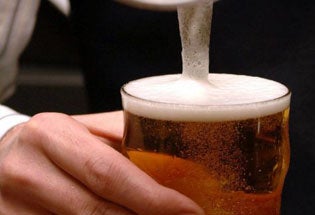Pubs clear to server smaller measures

After exerting an unrivalled grip on Britain’s drinkers for centuries, the traditional pint of beer faces its first substantial competition: from a Whitehall-approved smaller measure.
While the imperial pint saw off the last threat from Brussels three years ago by winning an unlimited opt-out from metric measures, pub traditionalists have lost their battle to halt the serving of less capacious Australian-style “schooners.”
The Department of Business today confirmed that during the next Parliamentary session it will amend laws requiring beer to be served only in thirds, halves or multiples of half pints to legalise the serving of two-thirds of a pint, the schooner.
During a complementary shake-up, licensed premises will also be able to sell wine in glasses as small as 75ml rather than the current 125ml minimum.
Science Minister David Willetts suggested the changes were an attack on bureaucracy rather than an attempt to get Britons to drink less, saying that no pub or restaurant should break the law by selling a small glass of wine. “We are freeing businesses so they can innovate and create new products to meet the demands of their customers,” he said.
The £28bn-a-year pub industry, which had been lobbying for the two-thirds pint, said its introduction would help make pubs more attractive to women.
“While the pint remains a great British icon, the two thirds pint will give greater flexibility over how beer is served. This is particularly important when it comes to getting more women to choose beer, as many avoid the traditional pint glass,” said Brigid Simmonds, chief executive of the British Beer and Pub Association, which represents big brewers such as Carlsberg and Heineken.
“As a lower strength drink with a wide variety of styles, tastes and flavours, there is no reason why beer shouldn’t be enjoyed in a wider range of measures and glass styles.”
The Campaign for Real Ale (Camra) had opposed the move on the grounds that under pressure barmaids and barmen could muddle the pint and schooners measures on busy weekend nights.
Jonathan Mail, Camra’s head of public affairs, also cautioned that having too large measures might also lead to people having greater difficulty keeping track of the number of units of alcohol they had drunk, while also expressing concern over the practicality of displaying price information in two formats.
However he suggested it was unlikely to result in the end of the imperial pint, one eighth of a gallon, or 568ml. “The British pint is familiar and the overwhelming majority of consumers prefer to drink half pints or pints of beer,” he said.
Join our commenting forum
Join thought-provoking conversations, follow other Independent readers and see their replies
Comments
Bookmark popover
Removed from bookmarks